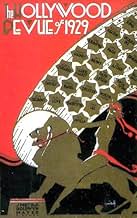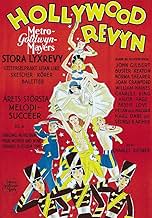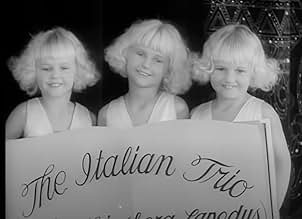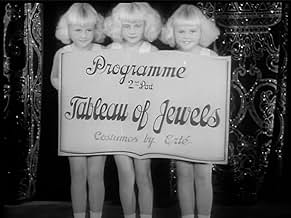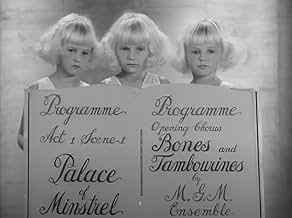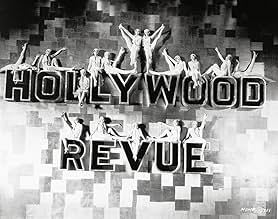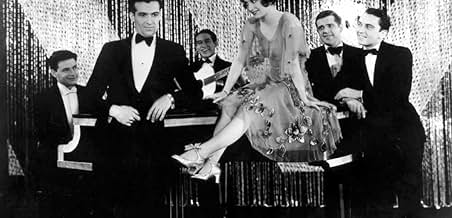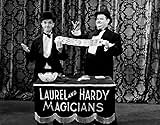IMDb रेटिंग
5.7/10
2.5 हज़ार
आपकी रेटिंग
अपनी भाषा में प्लॉट जोड़ेंAn all-star revue featuring MGM contract players.An all-star revue featuring MGM contract players.An all-star revue featuring MGM contract players.
- निर्देशक
- लेखक
- स्टार
- 1 ऑस्कर के लिए नामांकित
- 1 जीत और कुल 1 नामांकन
Cliff Edwards
- Ukelele Ike
- (as Ukulele Ike)
Nils Asther
- Nils Asther
- (काटे गए सीन)
Brox Sisters
- The Brox Sisters
- (as Brox Sisters - Singing Trio)
फ़ीचर्ड समीक्षाएं
This is an amazing film, it has amazing special effects, it shows who made the transition from silent to talkie and who didn't, it has scenes in color (two-strip technicolor from what I understand), and it has some of the cutest costumes of any musical.
Some of the highlights of the movie are Joan Crawford song and dance number, which is too cute for words, and not terrible as another IMDB commenter would have you believe.
The Buster Keaton snake charmer dance is absoluetly hilarious. The Betty Johnson hiding in Jack Benny's pocket is pretty cute.
And the Singing in the Rain number is great, with it's simple yet beautiful art deco set and it's great reflective floor textured with the pitter patter of rain.
If you ever get a chance to see this film, take advantage of it. It is so strange to see every MGM start (except Garbo and Lon Chaney) in the same film, especially since many of them didn't continue making a lot of talking pictures.
Outstanding!!!!!
Some of the highlights of the movie are Joan Crawford song and dance number, which is too cute for words, and not terrible as another IMDB commenter would have you believe.
The Buster Keaton snake charmer dance is absoluetly hilarious. The Betty Johnson hiding in Jack Benny's pocket is pretty cute.
And the Singing in the Rain number is great, with it's simple yet beautiful art deco set and it's great reflective floor textured with the pitter patter of rain.
If you ever get a chance to see this film, take advantage of it. It is so strange to see every MGM start (except Garbo and Lon Chaney) in the same film, especially since many of them didn't continue making a lot of talking pictures.
Outstanding!!!!!
I watched the tape I had made on 4/18/02 again today and read over some of the comments that have been made on this old curio and I felt the need to add a few more observations of my own.
- Firstly, I enjoy watching old films. I see them not as competitors with current entertainment but as portholes into the past. I see the past as a series of presents and the present as living history that we are privileged to witness. Old films allow us to `look' at past era, such as 1929, up close. Each era contains its classics, such as this same year's `All Quiet on the Western Front', that are so good that they are timeless. But most of what was created was material such as Hollywood Review of 1929, designed to provide entertainment for the masses, to the tastes of the age. These people were not making this film to entertain us but rather to entertain the audiences of 1929. They must have done a good job, as this was a big hit. There is plenty of material being produced today that will look just as silly to future generations. Some of it looks pretty silly right now.
- Keep in mind that while the cinema was three decades old at this time, sound recording was an infant. Not only do we hear the `clump clump clump of the dancer's feet but the limitations imposed on the camera by the new technology had stripped a generation of innovations from the medium and what we have is a very flat rendering of a stage review. In time, Hollywood would rediscover how to make films- essentially they filmed much of them in silence and added what sounds they wished us to hear afterwards. We could hear the tap of Fred Astaire's shoes but the clump of the dancer's feet would be muted. The songs would be dubbed in under controlled conditions in a studio. The same presentation would have been done a lot better just a few years later. But this is the best that could be done in 1929.
- In the wake of the development of sound, Hollywood rushed out movies that exploited the new technology as fast as they could, (this one was put together in 28 days), just as a lot of films today use computer generated monsters, armies, cliffs, etc., just to show off what they can do. We have to remember what a miracle watching movies stars talk must have seemed like at the time. Whenever a technical process becomes a drawing card in itself, other aspects of the movies are going to suffer- just as today we see many movies designed simply to show off computer technology that neglect to create human characters we can relate to or tell a coherent plot. I'm not sure I wouldn't rather see `Hollywood Revue of 1929' again than to see `Van Helsing' again. I wonder what the cast of the first would have thought of the second. They might have liked their product a little better.
- It was decided that the best way to exploit the new medium was to produce musicals. Talking was fine but people wanted to hear music, as well. And singing and dancing filled the bill. But the people who had become silent movie stars were not necessarily talented musical performers. Joan Crawford was a chorus girl but that's a long way from being a lead singer or dancer. Imagine modern Hollywood putting on a show like this- with Tom Cruise playing comic foil to some Saturday Night Live types and Julia Roberts dancing and singing. Would it come out any better?
It's best not to be too critical and just look through the crystal ball of the TV at the year nineteen hundred and twenty nine, up close and personal.
- Firstly, I enjoy watching old films. I see them not as competitors with current entertainment but as portholes into the past. I see the past as a series of presents and the present as living history that we are privileged to witness. Old films allow us to `look' at past era, such as 1929, up close. Each era contains its classics, such as this same year's `All Quiet on the Western Front', that are so good that they are timeless. But most of what was created was material such as Hollywood Review of 1929, designed to provide entertainment for the masses, to the tastes of the age. These people were not making this film to entertain us but rather to entertain the audiences of 1929. They must have done a good job, as this was a big hit. There is plenty of material being produced today that will look just as silly to future generations. Some of it looks pretty silly right now.
- Keep in mind that while the cinema was three decades old at this time, sound recording was an infant. Not only do we hear the `clump clump clump of the dancer's feet but the limitations imposed on the camera by the new technology had stripped a generation of innovations from the medium and what we have is a very flat rendering of a stage review. In time, Hollywood would rediscover how to make films- essentially they filmed much of them in silence and added what sounds they wished us to hear afterwards. We could hear the tap of Fred Astaire's shoes but the clump of the dancer's feet would be muted. The songs would be dubbed in under controlled conditions in a studio. The same presentation would have been done a lot better just a few years later. But this is the best that could be done in 1929.
- In the wake of the development of sound, Hollywood rushed out movies that exploited the new technology as fast as they could, (this one was put together in 28 days), just as a lot of films today use computer generated monsters, armies, cliffs, etc., just to show off what they can do. We have to remember what a miracle watching movies stars talk must have seemed like at the time. Whenever a technical process becomes a drawing card in itself, other aspects of the movies are going to suffer- just as today we see many movies designed simply to show off computer technology that neglect to create human characters we can relate to or tell a coherent plot. I'm not sure I wouldn't rather see `Hollywood Revue of 1929' again than to see `Van Helsing' again. I wonder what the cast of the first would have thought of the second. They might have liked their product a little better.
- It was decided that the best way to exploit the new medium was to produce musicals. Talking was fine but people wanted to hear music, as well. And singing and dancing filled the bill. But the people who had become silent movie stars were not necessarily talented musical performers. Joan Crawford was a chorus girl but that's a long way from being a lead singer or dancer. Imagine modern Hollywood putting on a show like this- with Tom Cruise playing comic foil to some Saturday Night Live types and Julia Roberts dancing and singing. Would it come out any better?
It's best not to be too critical and just look through the crystal ball of the TV at the year nineteen hundred and twenty nine, up close and personal.
Finally got around to seeing this on its recent outing on TCM, and despite the drawbacks - yes, it is slow-paced, yes, it is dated - there is a certain charm to it that makes it very enjoyable. I particularly liked the novelty acts and comedy stuff - Bessie Love, Marie Dressler, Laurel and Hardy and Buster Keaton's Egyptian lady. And the Gilbert/Shearer Romeo and Juliet section is worth sitting through the rest for anyway (despite its washed out colour, which oddly looked better in the little snippet showed in When The Lion Roars). I can't say I was disappointed with any of it - you get mind-boggling acrobats, you get weedy voiced Marion Davies, you get Jack Benny playing his violin and Conrad Nagel singing pretty well, and Charles King singing that hideous song about mothers, and Ukelele Ike, well, playing a ukelele, and Joan Crawford's ungainly dancing ... it's just a real treat, and nice to see from a technical pov that the sound isn't bad at all and despite its advanced age it is still watchable. A respectable 7 out of 10 I think.
This is the very first of the all-star, no-plot revues that proliferated during 1929 and 1930. Just about every star at Metro is featured, and there are many fun sequences to be savored in this film. The most famous one is probably the Joan Crawford segment, where she sings and dances to "Gotta Feeling For You". Her singing is passable, and her dancing is, well, "energetic". Marion Davies seems quite nervous in her "Tommy Atkins On Parade" number, but Bessie Love is pretty good in her wild acrobatics. Marie Dressler is fun, as always, and you can glimpse Carla Laemmle as the pearl in the oyster during "Tableau Of Jewels", which opens the second half. John Gilbert's speaking voice dosen't sound nearly as bad as had been rumored, even when considering the antiquity of the recording. The "Singin' In The Rain" number is fun, and offers a good contrast to the more famous one in the film of the same name. There are some special effects and two-color Technicolor that must have wowed the audiences back then, and it's been said that during the premiere, the theater put a gallon or so of orange-scented perfume into the ventilators during the "Orange Blossom Time" finale. In all, this film is well worth a look if you are into early sound films of historical value.
I love this film. I've commented before but just saw it again and have a few more "insights." It seems I like it better with each viewing. Along with The Broadway Melody and 42nd Street, one of the great early musicals--films that set the style and standard for decades to come. Yes there is debate as to the singing and dancing of Joan Crawford and Marion Davies, but there are great moments from Marie Dressler, Stan Laurel, Oliver Hardy, Buster Keaton, John Gilbert (I'm Utsnay about Ouyay), Norma Shearer, Cliff Edwards, the swell Brox Sisters, Conrad Nagel, Charles King, Polly Moran, Bessie Love, William Haines, Anita Page, the snappy June Purcell, Lionel Barrymore, Gus Edwards, a sly Jack Benny, and a slap-happy Ann Dvorak. Who could resist.
Oddities for a talkie include silent bits by Keaton and Laurel (Hardy does all the talking, and some schtick from Karl Dane and George K. Arthur (neither destined for talkie success) during a Benny violin solo. To carry forth the "revue" concept the film is introduced over a live orchestra pit and the intermission sees the musicians taking their seats to reprise the early tunes--Crawford's "Gotta Feelin' for You" chief among them. As noted in other comments, some acts are introed; some are not.
Considering all were singing live (no lip syncing here) the musical numbers are not bad at all. The recording (still primitive) hurts a little. Charles King comes off best as a straight singer, and the great Cliff Edwards (as Ukelele Ike) is a treat as the comic singer. Edwards does a straight intro to Singin' in the Rain as well as his signature falsetto scat. Joan Crawford, who sang in a bunch of early talkies, has a decent if unpolished voice, and her dancing was par for the course for 1929: lively but a little clunky. Remember, movie musicals were new and hadn't really developed a cinematic choreography. Marion Davies' number is the weakest in the film, which is too bad because she was a delightful performer, but singing and dancing weren't her high points. Marie Dressler cannot hit a false note. No matter how badly she mugs and hams it up, she is great. This film also shows hints of what Bessie Love might have done during the 30s with better handling by MGM. And ditto Polly Moran, who was diminished to playing Dressler's foil in a series of early comedies.
The Jack Benny we remember from his 1950s TV show is exactly the same 25 year earlier. All his mannerisms are in place as is his superb timing. Several parts of the film are very badly edited and sometimes hurt the timing or punchlines of comic bits. William Haines, nearly choking on a licorice button he rips from Benny's jacket, is handsome and gracious in a cameo.And Conrad Nagel reveals a not-bad singing voice as he serenades a ravishing Anita Page.
The Singin' in the Rain number rates highest. From the art deco set of Cedric Gibbons to the terrific singing of Cliff Edwards and the Brox Sisters, this number is a true classic. The dancing is simple but effective, the rain effects are OK as is the reflecting "pool." The reprise by the Brox Sisters (all 3 wrapped in 1 raincoat) is wonderful--as is the comic reprise by Dressler, Love, and Moran. Note the arm motions made by the Brox Sisters; they are same as used by Jean Hagen in the 1952 Singin in the Rain.
I love this film.
Oddities for a talkie include silent bits by Keaton and Laurel (Hardy does all the talking, and some schtick from Karl Dane and George K. Arthur (neither destined for talkie success) during a Benny violin solo. To carry forth the "revue" concept the film is introduced over a live orchestra pit and the intermission sees the musicians taking their seats to reprise the early tunes--Crawford's "Gotta Feelin' for You" chief among them. As noted in other comments, some acts are introed; some are not.
Considering all were singing live (no lip syncing here) the musical numbers are not bad at all. The recording (still primitive) hurts a little. Charles King comes off best as a straight singer, and the great Cliff Edwards (as Ukelele Ike) is a treat as the comic singer. Edwards does a straight intro to Singin' in the Rain as well as his signature falsetto scat. Joan Crawford, who sang in a bunch of early talkies, has a decent if unpolished voice, and her dancing was par for the course for 1929: lively but a little clunky. Remember, movie musicals were new and hadn't really developed a cinematic choreography. Marion Davies' number is the weakest in the film, which is too bad because she was a delightful performer, but singing and dancing weren't her high points. Marie Dressler cannot hit a false note. No matter how badly she mugs and hams it up, she is great. This film also shows hints of what Bessie Love might have done during the 30s with better handling by MGM. And ditto Polly Moran, who was diminished to playing Dressler's foil in a series of early comedies.
The Jack Benny we remember from his 1950s TV show is exactly the same 25 year earlier. All his mannerisms are in place as is his superb timing. Several parts of the film are very badly edited and sometimes hurt the timing or punchlines of comic bits. William Haines, nearly choking on a licorice button he rips from Benny's jacket, is handsome and gracious in a cameo.And Conrad Nagel reveals a not-bad singing voice as he serenades a ravishing Anita Page.
The Singin' in the Rain number rates highest. From the art deco set of Cedric Gibbons to the terrific singing of Cliff Edwards and the Brox Sisters, this number is a true classic. The dancing is simple but effective, the rain effects are OK as is the reflecting "pool." The reprise by the Brox Sisters (all 3 wrapped in 1 raincoat) is wonderful--as is the comic reprise by Dressler, Love, and Moran. Note the arm motions made by the Brox Sisters; they are same as used by Jean Hagen in the 1952 Singin in the Rain.
I love this film.
क्या आपको पता है
- ट्रिवियाIn the "Singin' in the Rain" finale, Buster Keaton is shown carrying a small package in his left hand. This visual gag is a reference to Uneeda Biscuits, then a popular product made by Nabisco. The Uneeda Biscuit trademark showed a small boy wearing a yellow rain slicker and hat (similar to the outfits that the cast is wearing in this number) and walking home in the rain with a package of Uneeda Biscuits under his arm.
- गूफ़After Cliff Edwards' opening number, one of the chorus girls in the background is chatting away with the girl next to her, when a sudden cut appears, and the same girl is now stone still (apparently the director told her in between to stop talking, and pay attention).
- इसके अलावा अन्य वर्जनSome sources list the original running time of "Hollywood Revue of 1929" as 130 minutes. At least two sequences in the original roadshow version are missing from current prints: an opening recitation by the showgirls who are seen posing in the "Hollywood Revue" sign after the opening credits, and the appearance of Nils Asther, who assisted Jack Benny in introducing the final "Orange Blossom" number.
- कनेक्शनAlternate-language version of Wir schalten um auf Hollywood (1931)
- साउंडट्रैकSingin' in the Rain
(1929) (uncredited)
Music by Nacio Herb Brown
Lyrics by Arthur Freed
Played during the opening by The MGM Symphony Orchestra
Played on ukulele and sung by Cliff Edwards and The Brox Sisters; Danced by chorus
Sung by the major stars at the end
टॉप पसंद
रेटिंग देने के लिए साइन-इन करें और वैयक्तिकृत सुझावों के लिए वॉचलिस्ट करें
- How long is The Hollywood Revue of 1929?Alexa द्वारा संचालित
विवरण
- रिलीज़ की तारीख़
- कंट्री ऑफ़ ओरिजिन
- आधिकारिक साइट
- भाषा
- इस रूप में भी जाना जाता है
- Hollywood Revue
- फ़िल्माने की जगहें
- उत्पादन कंपनी
- IMDbPro पर और कंपनी क्रेडिट देखें
बॉक्स ऑफ़िस
- दुनिया भर में सकल
- $52,77,780
- चलने की अवधि
- 2 घं 10 मि(130 min)
- रंग
इस पेज में योगदान दें
किसी बदलाव का सुझाव दें या अनुपलब्ध कॉन्टेंट जोड़ें


